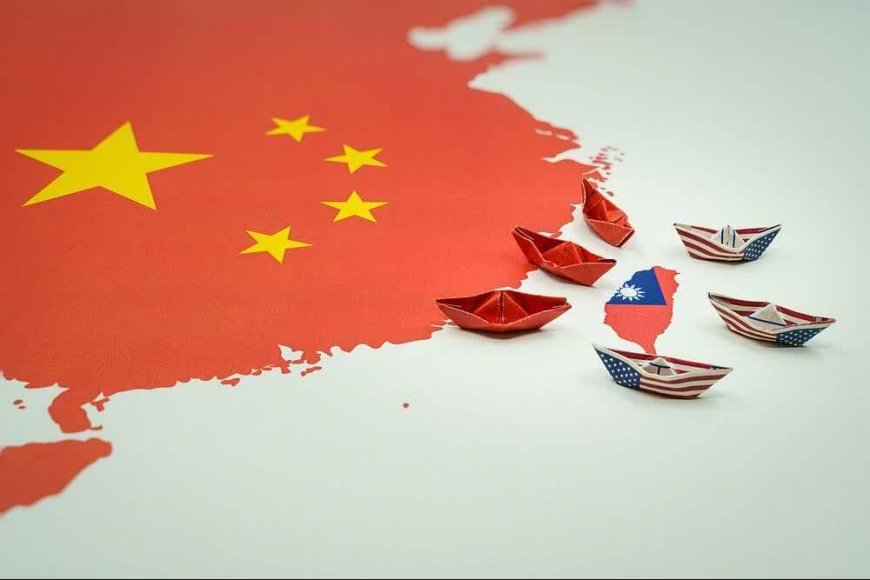The Rising Chinese Dragon: Undermining NATO in a Changing World Order
In the annals of modern history, China has steadfastly maintained its claim over Taiwan, a breakaway island of 22 million people, viewing it as an inseparable part of its sovereign territory. Over the past few years, Beijing has demonstrated its unswerving commitment to this line of policy through a series of military exercises conducted in the close vicinity of Taiwan, vigilantly monitoring Taipei’s every move in the South China Sea. As a direct consequence of this unwavering strategy, China has employed both economic and military blockades to encircle the geographically small island.

Given the several setbacks suffered by Western powers, spearheaded by NATO, in their confrontations with Russia on the Ukrainian frontlines, as well as their catastrophic failure in countering the resistance movements in occupied Palestine, it is therefore conceivable to expect that any dramatic escalation in China's pressure against Taiwan will undoubtedly mark yet another major strategic debacle for NATO and its allies. It is important to recognize that while Beijing’s tightening grip strategy over Taipei might appear, at the surface level, to be part of a long-term policy, it has proven to be remarkably effective in practice, prompting Western powers to contemplate the preservation and reinforcement of their military aid to Taiwan.
US Assistant Secretary of Defense for Indo-Pacific Defense Affairs, Ely Ratner, has astutely noted that the Chinese blockade of Taiwan would spur Taipei's allies to mobilize their resources in support of the island, as such a blockade would have devastating economic repercussions for the West. Meanwhile, the spokesperson of the US State Department, at the time, issued a statement imploring China to halt its military, diplomatic, and economic pressure vis-à-vis Taiwan. Yet, beneath the surface conditions lurks the underlying failure of NATO's ostensibly deterrent policies across the globe. This failure is more discernible following NATO's defeat and relative cessation of hostilities on the Ukrainian battlefronts, coupled with the continued defeat of Washington’s strategic ally in the Middle East, the Zionist regime, harbingering the imminent third failure of NATO in the past few years.
Observing NATO’s incapacity to effectively confront crises faced by its members and allies is not an arduous or convoluted task. In this era of the emerging world order, NATO is confronted with more formidable challenges. However, the primary predicament plaguing NATO these days lies in the absence of a consistent and unified approach among its members. This dilemma has been conspicuously evident in recent meetings, manifesting as strategic uncertainty as NATO's members must grapple with the pivotal question: What was the original purpose of NATO, and what actions must be undertaken to attain it? This key question highlights the absence of resolve to provide collective support and real cooperation against international challenges, particularly in the face of the crisis in Taiwan.
Many military experts concur that when NATO Secretary General Jens Stoltenberg asserted earlier this year that Russia and China were growing closer while expressing NATO's apprehension over China's substantial military advancements, his statement alluded to the necessity for NATO to ensure the very existence of allies in the Indo-Pacific region. However, this support may be limited to mere lip service, as NATO lacks the inner consensus and, more crucially, a centralized authority to confront China. Also, Stoltenberg voiced concerns about the future of Taiwan, cautioning, "What happened today in Europe—the war between Ukraine and Russia—could happen tomorrow in Asia." This seemingly straightforward statement by the NATO Secretary General underscores NATO's and its allies' trepidation regarding direct confrontation with the rising Chinese dragon.
Lastly, it should be acknowledged that the emergence of various conflicts worldwide, coupled with the potential for new crises to erupt, has engendered the formation of new alliances among independent nations, which may undermine NATO's main objectives. This issue becomes even more apparent when we examine NATO's lack of success in recent years, particularly in the Russia-Ukraine conflict, as well as the Palestinian people's resistance against the occupying Israeli regime, revealing the passivity and ineffectiveness of this moribund alliance.













































